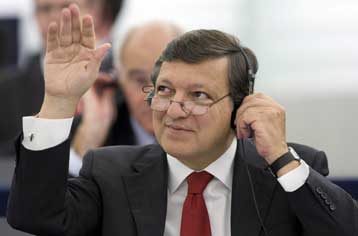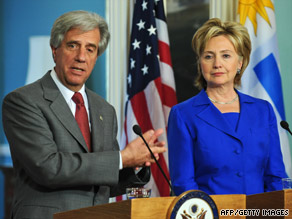Trafigura knew of waste dangers | |||||
BBC Wednesday, 16 September 2009 21:29 UK Newsnight has uncovered evidence revealing that oil-trading company Trafigura knew that waste dumped in Ivory Coast in 2006 was hazardous. Trafigura had persistently denied that the waste was harmful but internal e-mails show staff knew it was hazardous. On Wednesday, Newsnight learned that Trafigura has offered to pay damages to settle a class action brought on behalf of 31,000 who said they were injured. Up until now Trafigura has refused to settle denying it was to blame. The news of the settlement came as a UN report on claims that people had fallen sick or died as a result of the dump was published.
The report says there is "strong prima facie evidence that the reported deaths and adverse health consequences are related to the dumping of the waste from the cargo ship". The chemical waste came from a ship called Probo Koala and in August 2006 truckload after truckload of it was illegally fly-tipped at 15 locations around Abidjan, the biggest city in Ivory Coast. In the weeks that followed the dumping, tens of thousands of people reported a range of similar symptoms, including breathing problems, sickness and diarrhoea. Refinery by-product The story began four years ago at an oil refinery in Mexico, owned by the state company Pemex, or PMI.
In its chemical processes the refinery was producing a by-product - coker naptha, a dirty form of gasoline which could not be treated on site. The e-mails which Newsnight has obtained reveal that Trafigura executives realised they could make a fortune by buying the dirty Mexican oil for next to nothing. One e-mail says: "This is as cheap as anyone can imagine and should make serious dollars." However, to sell it on at a profit, Trafigura first had to find a cheap way to clean the coker naptha and lower its sulphur levels. Difficulties Trafigura chartered the Probo Koala and while the ship was off the coast of Gibraltar poured tons of caustic soda and a catalyst into the dirty oil to clean it - a rough and ready process known as "caustic washing". The method is cheap, but it generates such dangerous waste that it is effectively banned in most places around the world. Newsnight's report from May 2009 on dirty tricks and toxic waste in Ivory Coast The e-mails obtained by Newsnight show that in the months before the waste was dumped the company knew about the difficulties they would face in disposing of the waste. "This operation is no longer allowed in the European Union, the United States and Singapore" it is "banned in most countries due to the 'hazardous nature of the waste'", one e-mail warns. Another e-mail points out that "environmental agencies do not allow disposal of the toxic caustic". The process left a toxic sulphurous sludge in the tanks of the Probo Koala. Costly process Claiming that the waste was simply tank washings - the standard oil-water mixture produced by routine tank cleaning - Trafigura attempted to offload the waste in the Netherlands. However, when the waste was offloaded the smell was so strong, the emergency services were called. Samples were taken and Trafigura was told the waste was toxic and would cost hundreds of thousands of euros to treat safely. However, Trafigura opted for the much cheaper option of reloading the waste and taking it elsewhere. It ultimately ended up in Ivory Coast. Newsnight investigation from August 2007 Evidence seen by Newsnight shows that knowledge of the waste and problems getting rid of it went to the very top of Trafigura and the company's President Claude Dauphin. The Trafigura e-mails say that Mr Dauphin was urging his team to "be creative" in how they dealt with the hazardous waste. The contractor that they found in the end was Solomon Ugburogbu, the owner of a company called Tommy, which had no facilities to handle hazardous waste. Ugburogbu, is now serving a 20 year sentence for poisoning local people. Offer Trafigura has always denied and continues to deny any liability for events that occurred in Ivory Coast. In a statement to Newsnight on Wednesday the company said: "With regard to Trafigura's proposals for handling the treatment and disposal of the slops, Trafigura always sought to comply with the laws and regulations of the jurisdictions in which it operates." In 2007 they paid £100m to the Ivorian government to "compensate the victims" amongst other things. The government administered fund paid compensation to the families of 16 people whose deaths they believed were caused by the waste. On Wednesday Trafigura admitted a "global settlement is being considered" for the victims who suffered lesser injuries. A statement from the Ivorians' lawyers, Leigh Day and Company, confirms an offer has been made and says: "The claimants are very pleased and are keen to see the issue resolved." | |||||
ASTRAKHAN (South Russia), September 16 (RIA Novosti) - Russia's advanced S-500 air defense system could be developed in the next few years, the Air Force commander said on Wednesday.
The S-500 is currently at the blueprint stage at the Almaz-Antei company and is expected to be rolled out by 2012.
"This work is in progress...I think this system will appear in the near future," Col. Gen. Alexander Zelin said.
The new system is expected to outperform Russia's most advanced S-400 as well as the U.S. Patriot Advanced Capability-3 system.
The S-400 Triumf (SA-21 Growler) is capable of intercepting and destroying airborne targets at a distance of up to 400 kilometers (250 miles), and can simultaneously engage up to six targets.
The S-500 is expected to have an extended range of up to 600 km (over 370 miles) and simultaneously engage up to 10 targets. The system will be capable of destroying hypersonic and ballistic targets.
Zelin said Russia's Defense Ministry considers the delivery of S-400 air defense missile systems to the Russian Armed Forces a priority at present, although exports of these systems to other countries of the Commonwealth of the Independent States (CIS) could be considered.
The general earlier said in line with a new defense model air-space defense brigades within Russia's Air Force will be established and equipped with advanced S-400 and S-500 air defense systems.
Russia has already deployed two S-400 regiments to protect the airspace around Moscow and industrial regions in the central part of the country, and an S-400 battalion in Russia's Far East.














